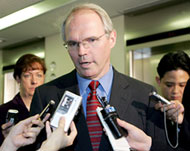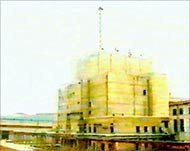N Korea: Nuclear talks off for now
North Korea has said it will not return to talks on its nuclear weapons programmes before mid-September at the earliest, blaming the delay on military drills between the US and South Korea.

A fourth round of six-party negotiations on the issue involving the two Koreas, China, the United States, Japan and Russia broke up on 7 August after 13 days of intense discussions.
All six sides had agreed to meet again this week but North Korean Foreign Minister Paek Nam-Sun said the war games had complicated matters.
“That is totally responsible for the delay of the next round of the six-party talks,” he said of the exercises that started last week, Japan’s Kyodo News reported from Pyongyang.
The drills, called Ulchi Focus Lens, have been denounced by North Korea as a dry-run for an invasion.
Asked how soon the talks might begin, Paek was quoted as saying: “Before the end of September … if things are going well, mid-September is also possible.”
The other five nations have accepted the delay, a South Korean official said in Seoul.
“There has been a consensus among the parties involved that the talks should be delayed given internal and external reasons,” the official from the South Korean foreign ministry told reporters on condition of anonymity.
Various reasons
However, he said the military drills were not the only reason the talks were on hold, citing Chinese President Hu Jintao’s visit to Washington next week and the appointment of a US presidential envoy on human rights in North Korea.
 |
|
US negotiator Christopher Hill |
China, North Korea’s closest ally and host of the talks, tried to put a positive spin on the developments, saying it was not important to set a date for their resumption.
“The date of resuming the talks is not important,” Deputy Foreign Minister Wu Dawei told Xinhua news agency after a hastily scheduled trip to meet Paek and other officials in the North Korean capital.
“The important thing is all the parties agreed to resume the talks and we all have kept contact and negotiation in the framework of the six-party talks.”
According to Kyodo, Paek said resumption of the talks “depends on the United States, actually”.
“The United States should abolish all the conditions that have compelled us to make the nuclear weapons,” he added.
Exchange offered
A Chinese draft statement submitted at the talks earlier this month reportedly offered North Korea a security guarantee and energy assistance in exchange for giving up its nuclear arsenal.
 |
|
N Korea insists on running nuclear |
But North Korea’s insistence on being allowed to run nuclear programmes for peaceful use emerged as a key sticking point.
The US has ruled out Pyongyang being allowed to operate light-water nuclear reactors to produce energy, although South Korea has said the North should have the right to maintain a civilian nuclear programme.
Despite the differences, chief US negotiator Christopher Hill said last week he did not believe the issue was “a show-stopper”.
Asked whether the US was prepared to be flexible, Hill said: “I think we have very strong arguments on our side. I think, consistent with our arguments and consistent with our interests, we can come up with something.”
The United States argues that the package being put together includes conventional energy supplies that would replace the energy capacity of the light water reactor.
South Korea has already offered to supply its northern neighbour with large supplies of electricity if it renounces nuclear weapons.